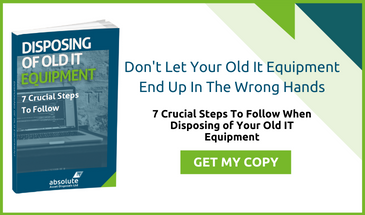
At Absolute IT, we're deeply experienced when it comes to the safe, clean, and secure disposal of all types of IT assets. However, there are some vital steps that every user and administrator can take before they pass their old and unwanted IT equipment to us for recycling. These simple tips will help you avoid data breaches, prevent the spread of toxic pollution, and stop you scrapping equipment that's still usable.
1) Rogue Data
Are your old hard drives and USB sticks clean? If not, then they should be. Old files, particularly financial data spreadsheets and personal contact information leftover on business computers, can be recovered and read from a hard drive left in a recycled unit. This is particularly so with older, magnetic SATA drives, as even 'deleted' data can be recovered. The Recycle Bin function in Windows only designates the space on the HDD the file occupies as 'free'. It doesn't erase the file.
Remember - everything could be of use to a dedicated criminal. Failure to delete your confidential customer files could mean that you run foul of the law as well. Drives should be fully formatted or removed before the disposal of any used PCs and laptops. The same rules apply to USB sticks, CDs, and floppy disks. If you need to permanently destroy a magnetic drive, a drill can be used to repeatedly puncture the hard disk casing – or use an IT asset disposal partner. Servers and private devices should be treated in the same way as business equipment.
2) Scrapping A Working Device And/Or Components
If the machine is still in working order, you may want to consider keeping parts of it, selling it or donating it. Many charities and libraries are crying out for older tablets and PCs that can run Android or Windows. Working units can often be wiped and resold for a profit, although you may need specialist knowledge to do this successfully. An OS reinstall and streamline often speeds up slow, 'outdated' devices. Many 'vintage' units are also worth surprisingly large amounts of money to the right people.
It's worth thinking twice before you send a functioning item off to the recycling centre. Many recycling companies (including Absolute IT) offer their services to restore old electronics to top condition on request. Likewise, you should consider salvaging and testing any old parts from broken machines. Obscure computer spares steadily increase in rarity and value with time. Faults such as a motherboard, screen, or HDD failure can disguise the fact that other internal components, such as the RAM and GFX chip, are still perfectly healthy.
Don't bundle good devices that are still usable in with the rubbish by mistake, either. USB 2.0 or later peripherals (such as keyboards and mice) can easily be repurposed without fuss if the entire machine has to go.
Again, it is essential that all data-carrying assets are sanitised using Blancco erasure software before they are decommissioned or resold. An ITAD specialist such as Absolute IT will be able to help you with this.
3) Dumping
Some unscrupulous ‘recycling companies’ may try to save money by fly-tipping or sending used electronics to the landfill, as happens with other white goods. These methods of disposal are always a grave mistake.
Fly-tippers in the United Kingdom face an unlimited fine and up to five years in jail if caught and prosecuted. Improper disposal of used IT devices can also result in toxic chemicals leaking into the environment. Cadmium and arsenic are two poisonous elements found within circuit boards that can damage the countryside, food crops, and wildlife through entering the water cycle. This can also happen if electronic waste is sent straight into a landfill without sanitisation. You should always contact a professional IT asset disposal and recycling company to get rid of your unwanted devices. We operate a 0% landfill policy and are committed to sustainable recycling.
4) Losing Track Of Your IT Assets
Too many organisations rush into shipping off their IT rubbish with little regard for checking the credentials of the recycling company in question. Make sure that you hire a third-party company that is certified to deal with electronics recycling via WEEE accreditation. Recycling companies should also be upfront with you about when, where, and how they dispose of your assets. There is a thriving underground trade in illegally shipping e-waste overseas for disposal or refurbishment by prison or child labour. Other e-waste is simply dumped and abandoned in remote locations to save money. Beware any generous offers of 'free' or severely discounted electronics recycling - someone may be making an unfair profit from your rubbish.
Your Assets, Your Responsibility
If your IT recycling company can't answer detailed questions about how their production line works, offer a price too good to be true, or can't give examples of their completed orders, it's probably time to look elsewhere. You may prove legally and financially liable for any laws broken by the 'recyclers'.
It's also important to keep track of the precise number and type of items that you've scheduled for recycling or disposal. A black hole left in your IT inventory or legal records is never a good look. Careful monitoring can also check if any discrepancies have occurred in billing. You don't want to be accidentally charged for recycling items that never actually existed.
For a secure, reliable and efficient approach to IT asset disposal, please call today on 01332 371 989.
Image Source: pixabay.com











